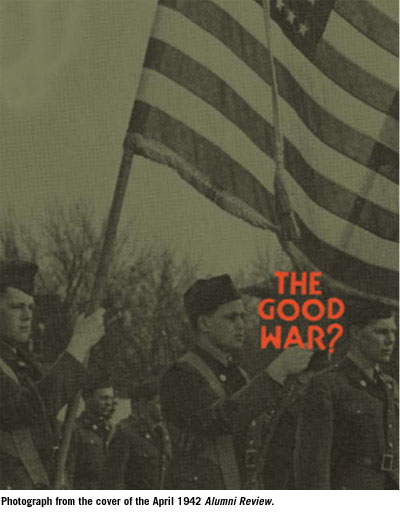
Memories of World War II have loomed especially large since the tragic events of Sept. 11, 2001. Many have compared the terrorist attacks on the World Trade Center and Pentagon to the Japanese raid on Pearl Harbor on Dec. 7, 1941. The 60th anniversary of the latter also received widespread recognition in the media. NDSU's World War II Reunion last August enabled alumni who were veterans of the war to share recollections of their experiences.
To be sure the conflict was far from a forgotten war before Sept. 11, innumerable books and numerous films and television programs kept it in the public eye. Authors described it as "the good war" and the Americans who fought it as "the greatest generation." Many have attempted to explain its "meaning," not always successfully.
To determine the true meaning of such a many-faceted historical process is after all a daunting and perhaps impossible task. A better course may be merely to attempt to answer questions about the nature of the conflict.
For example, was it really a "good war"? In many respects the answer is certainly yes. It ended the nightmarish quest of Adolf Hitler to create a new order in Europe based on German domination and extermination of those peoples the Nazis considered "lesser breeds." It also ended Japan's expansion over East Asia and its brutal oppression of the populations that fell under its control. It contributed greatly to the postwar collapse of European imperialism in Asia and Africa and the creation of new states in those areas, although not always with the happiest results. In the war's aftermath, democracy flourished as never before in much of Europe and parts of Asia, including both Germany and Japan.
But not all aspects of the war were so beneficial. Perhaps as many as 40 million people lost their lives. Many more suffered permanent injuries. Millions were left homeless. Victory also came too late to prevent the mass murder of six million Jews as well as many other victims of Hitler's perverted racial ideas. Sadly, too, the Allies took no action to impede this slaughter, such as bombing the rail lines leading into the death camps.
The Allied war effort also escalated in vindictiveness and brutality as time passed. This took the form of massive area bombing raids on German cities, firebombing attacks on Japanese population centers, and finally dropping atomic bombs on Hiroshima and Nagasaki. Hundreds of thousands of civilians in both countries died.
World War II also shattered the prewar power structure of the world. The United States and the Soviet Union emerged from the conflict as superpowers, towering above all other nations and threatening the possibility of a world split into two rival power blocs and divided ideologically. When the war ended in Europe, the Red Army controlled all of the eastern portion of the continent. Communist governments quickly gained power in the countries under its domination and became closely linked to Moscow. Fearful of Soviet expansion westward, the U.S. responded with measures to bolster Western Europe economically and militarily. Gradually the superpowers found themselves entangled in a form of hostility known as the Cold War. The advent of the atomic bomb added a new dimension to this rivalry - the specter of nuclear war and mutual annihilation.

The Cold War also spread to Asia with the victory of the Communists over the Nationalist government of China in 1949 and the outbreak of the Korean War the following year as well as Communist insurrections in various European colonies, most notably French Indochina. Clearly the "good war" had not created a world of peace and tranquility as so many had hoped.
Were the Americans who helped secure the Allied victory in World War II really the greatest generation? This is a difficult question to answer. It is far easier to apply labels to generations than to prove that one is superior to another. But clearly this one faced a task far more challenging than those confronting most generations.
Its members fought two dangerous enemies simultaneously at opposite ends of the earth. In the Pacific they served bravely in such Godforsaken places as New Guinea, Guadalcanal, Tarawa, Iwo Jima, and Okinawa. They almost single-handedly defeated the Japanese, although with some help from the British and Australians. They fought just as courageously in the European theater - in North Africa, Sicily, the Italian mainland, France and Germany - although here Britain and the Soviet Union also played major roles in securing victory.
Popular writers often refer to June 6, 1944, the day the Western Allies landed on the coast of Normandy, as the most important day of the war. In a sense, it was, but not as it is frequently portrayed. Contrary to a still prevailing myth, the D Day invasion did not prevent a German victory in the war. The Red Army had already assured Germany's defeat long before D Day - before Moscow in 1941, at Stalingrad in 1942, and in the enormous tank battle at Kursk in 1943. The true achievements of the men who invaded Normandy in 1944 were to shorten the war significantly and most importantly to prevent the Soviets from overrunning all of Western Europe. Thanks to them, the postwar "Iron Curtain" ran through Central Europe, not along the Atlantic Coast. This was indeed an enormous accomplishment, one that we should revere on its own merits.
-Michael J. Lyons

































